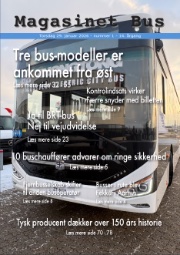LoginDenne side kræver abonnement, indtast dit brugernavn og Kodeord for at se artiklen! |
- World Energy Outlook 2022 shows the global energy crisis can be a historic turning point towards a cleaner and more secure future
- Nine EU Member States are calling on the European Commission to accelerate the phase-out of petrol and diesel cars in the EU
- - We need a clearly defined target to reduce domestic greenhouse gas emissions
- More than 33,000 new electric vehicles were registered in Germany in August
- EU invests over 2 billion euros in 140 key transport projects to jump-start the economy
- Suspected fraud with diesel defeat devices in Germany, Italy and Switzerland
- Polish authorities arrest eight in latest migrant smuggling sting
- 26 arrested for smuggling irregular migrants through Belgium and France
- Remember to switch your British driving permit to a Danish
- Panalpina and DSV agree to join forces
- Truck industry reacts to EU proposal for first-ever CO2 standards
- Remondis expands its activities in Denmark
.gif)




